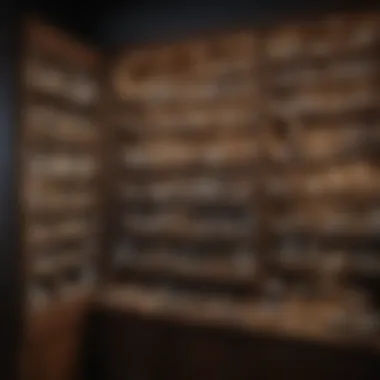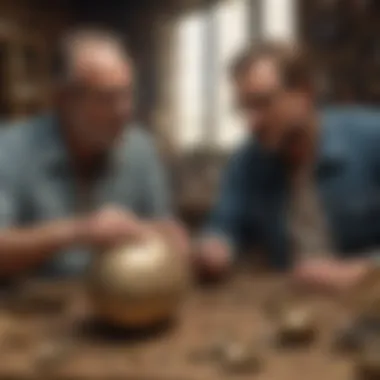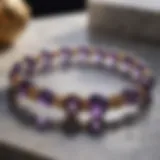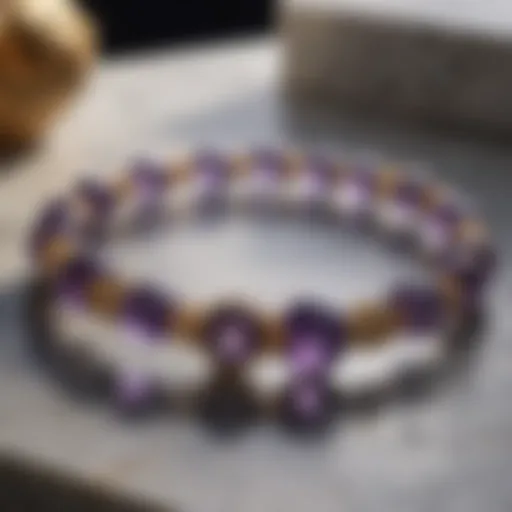Discovering Coolpieces: A Collector's Definitive Guide


Intro
The allure of coolpieces, unique geological specimens with distinct beauty and scientific relevance, has attracted both novice and seasoned collectors alike. Understanding the fascinating attributes that define these items can enhance one's appreciation and collecting endeavors. This guide explores various aspects of coolpieces, from identification to preservation, offering practical advice for enthusiasts.
Rock and Fossil Identification
Identifying rocks and fossils is a foundational skill for any collector. Many variables exist in the geological world, but certain criteria can help streamline this process.
Types of Rocks and Fossils
Rocks can be classified broadly into three categories: igneous, sedimentary, and metamorphic. Each category has its own properties and formation processes:
- Igneous Rocks: Formed from cooling and solidification of molten magma. Common examples include granite and basalt.
- Sedimentary Rocks: Comprising particles from other rocks, minerals, and organic materials. Examples include limestone and sandstone.
- Metamorphic Rocks: Created from the alteration of existing rocks under pressure and heat. Notable examples are marble and schist.
Fossils typically come from sedimentary rock and offer insights about prehistoric life. Common fossil types include bones, shells, and plants.
Characteristics to Look For
When identifying coolpieces, several characteristics can aid significantly,
- Luster: The way a surface reflects light. For example, rocks like quartz can be glassy, while others might appear dull.
- Hardness: Measuring a rock's resistance to scratching can be enlightening. The Mohs hardness scale is a useful reference.
- Color and Texture: Observing color patterns and textures often provides key clues about a rock's identity.
Tools for Identification
Various tools can assist in the identification process. To get started, consider the following:
- Hand Lens: Magnifying glass for detailed observations.
- Screwdriver: Useful for prying pieces from harder surfaces.
- Field Guide: A reliable rock and fossil identification book to facilitate research.
Collecting Tips and Techniques
Successfully collecting coolpieces requires a mix of strategy and care. Following some best practices can enhance your experience and results.
Best Practices for Collecting
Understanding the natural environment is essential,
- Respect local laws and regulations regarding collection.
- Collect sparingly to ensure sustainability for future enthusiasts.
Locating Prime Collecting Sites
Fossil and rock gathering is often site-specific, with popular locations worldwide,
- Visit riverbeds, sea cliffs, and quarries known for rich deposits.
- Engage with local collector communities online or in places like https://www.reddit.com/r/FossilId for site suggestions.
How to Safely Extract Specimens
When collecting, prioritize safety:
- Use gloves to prevent cuts.
- Bring containers for delicate specimens to avoid breakage.
- Be aware of your surroundings to maintain personal safety.
Preservation and Display
To maintain the integrity and aesthetic of coolpieces, employing appropriate preservation methods is crucial.
Techniques for Preserving Rocks and Fossils
Preservation options include:
- Keeping Dry: Storing specimens in a dry environment prevents mold and deterioration from moisture.
- Avoiding Direct Sunlight: Displaying pieces in shade avoids damage from UV radiation.
Proper Storage Methods
Invest in storage solutions that protect against elements:
- Use acid-free boxes or containers for long-term storage.
- Employ silica gel packs to control humidity within storage files.
Creative Display Ideas
Many collectors take pride in showcasing their collections. Creative options can include:
- Display cases with appropriate lighting.
- Natural backdrops, like pebbles or wood, for an artful presentation.
Geological Insights
Understanding geology enriches any collecting experience.
Geological Formations and Processes


Knowledge of geological formations can aid in finding unique specimens. Key concepts include:
- Continental Drift: The movement of the Earth’s plates shapes rock formations.
- Sedimentation: Layers of deposits lead to fossil formation capabilities.
Historical Significance of Rocks and Fossils
A collector benefits from digital resources such as https://en.wikipedia.org/wiki/Geology. Documenting the history behind stones adds layers to collection narratives.
Notable Discoveries in the Field
There are moments in geology, exemplary of monumental discoveries. These instances collectively bring attention to the residue of ancient life our planet often holds. Noteworthy clicks, using geology forums or platforms like https://www.facebook.com/rockhag can expand knowledge of these topics further.
Collectively, these elements inform the intriguing world of coolpieces. This collection of insights and techniques fosters a deeper appreciation while promoting responsible gathering and thoughtful investor strategies.
Understanding Coolpieces
Exploring coolpieces is essential for anyone engrossed in the world of geology and collectibles. These specimens encapsulate unique geological attributes that can not only beautify a collection but also hold significant scientific value. By gaining a firm grasp on what defines coolpieces, collectors can better locate and select materials that not only resonate with their aesthetic senses but also sustain their informational interests.
Defining Coolpieces
Coolpieces are generally recognized as geological specimens that attract attention due to their rarity, uniqueness, or striking appearance. These might include colorful minerals, exceptional fossils, or remarkable geological formations. The diversity of these items is immense, appealing to different tastes and interests. By defining coolpieces accurately, we can cultivate a sharper focus on collectors’ needs—encouraging informed decisions based on quality, authenticity, and aesthetic appeal.
These items serve underwent intrinsic traits that delineate their charm. For example, moral characteristics such as color, clarity, and texture play vital roles in their overall evaluation.
Historical Context
The fascination with geological specimens dates back centuries. Ancient societies revered unique minerals and fossils, often attributing mystical qualities to them. Today, this interest has evolved into a structured pursuit of collecting. The history of coolpieces can provide insight into how various cultures have appreciated natural history, a connection that enriches the collector experience by placing personal passion within a greater context.
For many, the stories that accompany these pieces contribute immensely to their desirability. These objects bear marks of their environments, geological processes, and historical epochs, connecting today's collectors with the vast timeline of Earth's evolution. Understanding these aspects provides a contextual depth that enhances appreciation.
Cultural Significance
The cultural significance of coolpieces varies widely across environments and communities. In some cultures, minerals and fossils denote status and provide connections to ancestry or geographical history. These items can also symbolize environmental awareness, emphasizing the ongoing relationship between humans and the planet.
In modern times, collecting coolpieces connects individuals through groups and forums. Communities discussing acquisitions and preservation techniques reflect shared values around conservation and recognition of Earth's natural art. As such, these objects act not merely as collections but as conversation starters about Earth's richness, engaging new audience in geological conversation.
Collecting can facilitate learning and community building, often playing a crucial role in environmental appreciation and stewardship.
Types of Coolpieces
Understanding the various kinds of coolpieces is essential for collectors who seek to broaden their horizons. Each category offers a unique set of characteristics, historical context, and aesthetic appeal. Knowing these distinctions not only enhances the collection but also informs better decisions regarding preservation and presentation. Educated collectors greatly benefit from understanding these types; they can appreciate each coolpiece's value more accurately within the broader tapestry of geological specimens.
Minerals
Minerals are one of the root categories within coolpieces, captivating both collectors and historians for centuries. A mineral is a naturally occurring substance formed through geological processes with distinct physical and chemical properties.
Some notable collectable minerals include quartz in various forms like amethyst and citrine. These minerals often serve various purposes in the industry and have aesthetic value. Their crystalline structure can reveal details about the conditions under which they formed, allowing a collector to gaze into Earth’s complex processes. Moreover, owning unique minerals can enhance a collection’s allure and intrinsic value.
When choosing to start a mineral collection, collectors should prioritize several factors. Understanding the local geology can lead to discoveries of regional specialties. Choosing high-quality specimens—with minimal damage and clear unique patterns—can significantly raise one's collection standing in a community.
Fossils
Fossils offer a captivating glimpse into Earth's past. They are signs of once-living organisms preserved in rock, allowing collectors to grasp bygone environments and the evolution of life. The diversity of fossils is astounding, ranging from delicate fern impressions to immense dinosaur bones.
Fossil collecting can yield profound satisfaction. Understanding species, genres, and even extinction events enriches one’s engagement with the subject. Collectively, fossils are not just glimpse into history; each item tells its unique story.
When curating fossil collections, collectors must maintain an ethical approach. Adhering to legal regulations ensures responsible Googling practices, including sourcing from recognized dealers and participating in reputable digs. Clarifying historical significance and provenance can provide depth to the collection and further its educational component.
Geodes and Crystals
Geodes are intriguing geological formations which can add brilliant display to any collection. These hollow rocks often contain crystal-lined interiors, producing stunning colors and arrangements. When one cuts open a geode, unpredictability reigns. Inside, vivid amethyst, citrine, or quartz striations may be unveiled, thus creating a visual feast.
On the other hand, standalone crystals, like tourmaline and calcite, also command attention and respect in collectors' circles. When selecting these attractive specimens, collectors should focus on clarity, color depth, and coping. Surprisingly, the value often peaks when these characteristics align impressively.
Caring for geodes and crystals requires special handling as they can be fragile. Implementing effective desde strategies, like using felt or foam for protection during transport, ensures the integrity of the pieces. In addition, expertly displayed collections, benefitting from good lighting, invite both appreciation and wonder.
For many collectors, type of coolpiece is not just a game-change; it is the essence of their collecting journey. Understanding the distinctions enhances both enjoyment and value comprehension.
By acknowledging these categories, collectors position themselves better to identify priority additions to their collections. Far beyond basic understanding, knowing the depths and the beauty within each type reinforces both passion and purpose in the inviting universe of coolpieces.
The Art of Collecting
Collecting coolpieces is not just a hobby, but a meaningful pursuit that enriches lives of many enthusiasts. The importance of exploring the characteristics of this art cannot be overstated. The choices a collector makes significantly impact their satisfaction and the future of their collection. Understanding how to effectively navigate this landscape enhances the enjoyment of collecting by allowing individuals to engage more thoughtfully with their pieces.
Finding Sources
Local Outcrops


Finding coolpieces in local outcrops can be an exhilarating aspect of collecting. Collectors often connect deeply with landscapes that hold historical and geological significance. One of the key characteristics is the opportunity for collectors to source pieces with local provenance. This adds personal meaning and insight into the origins of the items.
The unique feature of local outcrops is that collectors can observe the conditions that led to the formation of specimens in real time. Thus, they gain an understanding that is hard to replicate in a synthetic environment like shops or online platforms. However, a disadvantage is that access can be limited by regional laws or environmental protection measures. Yet, the hunt can be very rewarding when you successfully extract a fine specimen.
Rock Shows and Expos
Rock shows and expos serve as community hubs for collectors. These events highlight the diversity and richness of available materials. Attendees gain the chance to interact with experts and fellow collectors, fulfilling both social and educational needs. What makes these gatherings particularly beneficial is the ability to evaluate a wide range of specimens in person.
A significant advantage of attending rock shows is that they often feature reputable vendors who offer insights that go beyond what can typically be found online. The interaction helps collectors understand pricing and bargaining tactics. However, these events can become quite crowded and competitive, making it a bit challenging for novice collectors unfamiliar with market dynamics.
Online Marketplaces
With the rise of online marketplaces, such as eBay or Etsy, reaching rare pieces has become less challenging. This accessible nature makes it easier for collectors from all areas to browse and acquire specimens without geographic constraints. Online platforms enable 24/7 access to a variety of items. This characteristic keeps buyers engaged and better-informed about worldwide trends.
However, potential disadvantages exist here; one must be cautious about the authenticity of pieces sold online. The ease of purchase should come with careful scrutiny, and buyers are often unable to completely examine quality before the transaction. Nevertheless, arranging to return items is often feasible if problems are spotted post-arrival.
Evaluating Quality
Understanding Characteristics
Understanding characteristics of coolpieces is essential for any collecting effort. This topic delves into the inherent properties that differentiate high-quality items from lesser ones. Among these characteristics, clarity, color, structure, and overall aesthetics must be considered. Collectors increase their confidence and satisfaction by knowing what to look for.
Highlighting unique features such as luminescence or crystalline patterns further enables a collector to make educated choices. One major advantage of focusing on characteristics is that it promotes long-lasting relationships with pieces that resonate personally, enhancing enjoyment.
Assessing Authenticity
In a realm where transactions occur frequently, assessing authenticity is paramount. This practice protects collectors from fraudulent acquisitions. Understanding common forgeries and recognizing signs of authenticity helps gather trustworthy information that leads to informed purchases.
A notable feature of assessing authenticity is adapting criteria to varying types of coolpieces. For instance, some minerals will display inclusions that are specific to their natural formation process, serving as Evidence. The added advantage of authentication knowledge also provides collectors a network with which they can share guidance in community forums. Buyers must be aware of potential pitfalls, though, such as over-relying on seller provided certificates.
Authenticity is a commitment to the integrity of your collection and establishes your position within the collector's community.
Preservation Techniques
Preserving coolpieces is essential for any collector. Detailed attention to preservation ensures the longevity and quality of these unique geological specimens. By understanding how best to care for them, collectors can maintain their aesthetic and scientific value.
Effective preservation methods protect against environmental factors which can cause deterioration. Proper cleaning and safe storage options amplify the enjoyment and aesthetic appeal of coolpieces. Without these techniques, items risk damage that can affect both their look and worth.
Cleaning Methods
Safe Cleaning Materials
Using safe cleaning materials is crucial for maintaining the integrity of coolpieces. Gentle agents such as soap and water are often recommended for routine cleaning. These materials should not induce scratches and should work without affecting the geological finish of the pieces.
One key characteristic of safe materials rests in their non-abrasiveness. Unlike harsh chemicals or powered cleaners, protected solutions prevent layers from being stripped away. Adopting safe materials keeps your items secure while recognizing their beauty, preserving not just their structure but their value as well.
Advantages of safe cleaning materials include:
- Accessibility: Most collectors have these materials at hand.
- Effectiveness: Cleansing without causing harm to specimens.
However, disadvantages can include potential uncertainty in results when dealing with particularly tough dirt or stains. Thus, vigilance during cleaning is vital.
Preventing Damage
Preventing damage to coolpieces begins even before initial contact with any cleaning agent or material. This involves careful assessment and handling methods during exhibitions and transportation.
Protection elements can range from orders as simple as using soft cloths for dusting, to creating appropriate barriers from sunlight, and moisture exposure. A major characteristic of preventing damage is its proacive directive, which discourages harmful encounters before they occur. Collectors who grasp this method notably extend the lifetime of their prized coolpieces.
Advantages of this approach are:**
- Reduced Risk: Minimizes exposure to damaging pollutants.
- Enhanced Display Quality: Artfully arranged pieces that contribute positively to overall looks.
A downside lies in mistakes that don't become evident until it's too late. It requires learnings through practice and observation.
Storage Solutions
Display Cases
Display cases represent an impressive method for storing coolpieces while exhibiting them beautifully. A well-designed case allows one to showcase collection without exposing items to potentially harmful elements.
One vital characteristic of display cases is protection against elements. They limit dusty accumulation, protect against physical bumps, or potential drops. Display cases allow collectors to effectively share valuable specimens while preserving them in best condition possible.
Advantages of display cases include:
- Visibility: They put pieces on proud exhibition while minimizing damage.
- Control: Providing limited opportunities for physical handling, thus reducing risk of wear and tear.
The main disadvantage remains the cost of quality cases, requiring an upfront and ongoing investment depending on collector needs.


Climate Control
Being aware of climate around coolpieces is essential for preservation. Climate control addresses the unpredictability of humidity and temperature that discern certain specimens' conditions.
Balanced climate protecting against overly dry or damp atmospheres is crucial. This especially affects minerals and fossils, which can be sensitive to moisture levels. One of climate controls great characteristics juxtapositions it brings 'regulation' to environments for the safety of coolpieces.
Essential benefits provided include the following:
- Longevity: Proper temperature reduces degradation from air exposure.
- Confidence: Predictably stored pieces yield lesser surprises in deterioration.
But there's need to observe certain stored conditions, such as analyzing significance of conscious collector spending on these adjustments.
Proper preservation techniques not only maintain the aesthetic value of coolpieces, they uphold their detector value.
Market Trends and Value
Understanding the market trends and value of coolpieces is important for both new and experienced collectors. Analyzing these trends helps collectors make better decisions concerning acquisitions and sales. Knowledge about market dynamics can affect choices regarding investments, trading strategies, and even personal enjoyment within a dedicated community.
Current Market Dynamics
The world of coolpieces is highly influenced by various factors that shape its market presence at any given time. Trends can change due to shifts in demand, global interest in geological study, or even fashion influences within collector circles.
Some key points include:
- Demand Fluctuations: Awareness of certain minerals or fossils often increases dramatically after documentaries or news articles highlight their uniqueness.
- Economic Factors: Current economic performance can also refine collector's capacity and choices. Wealth increases and downturns affect discretionary spending on luxury items.
- Online Influence: Marketplaces like eBay and specialized websites provide platforms for seemingly universal access, thus altering how collectors engage in purchasing.
Staying updated through resources such as articles on Wikipedia or following discussions on Reddit ensures being well informed.
Appreciating Values Over Time
A phenomenon observed throughout many collector markets, including coolpieces, is value changes over time. Initial acquisitions may not immediately convey increased monetary worth, but history often showcases gradual appreciation.
Key factors include:
- Rarity: Unique specimens become increasingly desirable as they become harder to find.
- Condition: Well-preserved items typically command higher prices. Collectors often prioritize preservation methods.
- Historical Relevance: Items with a significant background may sway value dramatically, particularly if associated with scientific advancements.
An important aspect is the collectors’ worth focusing on enjoyment rather than just a financial return. Collectors should engage with their items’ rich histories and uniqueness instead of merely viewing them as financial investments.
Engage with fellow collectors to share insights about past trends and establish a sense of community that enhances the collection experience.
Understanding these aspects provides invaluable insights into what influences the value of coolpieces over time. Collectors dedicated to their trade can illuminate pertinent trends while inspiring others into appreciating the effort and depth that their coolpieces embody.
Community and Sharing Knowledge
The domain of coolpieces transcends mere hobbyism; it embodies a rich interconnection of people who share similar interests and passions. Understanding the importance of community and the sharing of knowledge is pivotal for both novice and seasoned collectors. This section discusses how these elements foster growth, enhance appreciation, and deepen engagement with the unique geological specimens cherished by collectors.
Benefits of Networking
Networking is indispensable in any field, and collecting coolpieces is no exception. Through networking, collectors gain access to a treasure trove of insights and opportunities that might otherwise remain elusive.
- Learning Opportunities: Connect with seasoned collectors who can offer valuable lessons and advice gleaned from years of experience.
- Access to Rare Finds: Engage with fellow enthusiasts about unique finds and offers, leading to potentially missable opportunities. Networking might lead to private sales or swaps of extraordinary specimens.
- Community Support: Share experiences and challenges with others in the community. This nurturing environment cultivates motivation and commitment to collecting.
Effective networking can take many forms. Attendance at rock shows, participation in online forums such as Reddit or Facebook groups, and local club meetings enable collectors to build essential connections. Each interaction can yield insights into preservation methods, market trends, and proper valuation techniques.
Contributing to Collectors Groups
Participation in collectors groups significantly enhances both the collector's knowledge base and their network. Many aspiring collectors underestimate the personal growth available through community participation.
- Resource Sharing: Collectors often share resources such as articles, videos, and tutorials, enriching the collective knowledge and skillset within the group. This helps in reinforcing best practices for preservation and evaluation as discussed in prior sections.
- Collective Strength: By contributing personal expertise or active engagement in group activities, members enrich the community. This can spark insightful dialogues about trends and value assessments and foster collaborative research interests.
- Mentoring: Experienced collectors often take on mentorship roles, guiding novices through complex topics regarding destination collecting, snippet preservation techniques, and market fluctuations.
Access to an established community can drastically cut down the learning curve, ensuring that novice collectors avoid critical pitfalls and less cherished approaches to their hobby.
“Knowledge increases by sharing but diminishes by hoarding.” This axiom encapsulates the essence of community in the collecting sphere. The drives for connection can lead to personal enrichment and an expanded understanding of coolpieces.
In summary, nurturing community ties and focusing on knowledge sharing translates the solitary practice of collecting into an engaging, shared journey for all participants involved. With the right connections and open sharing, any collector—from beginner to expert—can enhance their appreciation and skill in dealing with coolpieces.
End
In this article, we explored various aspects of coolpieces in depth. The topic of conclusion is critical as it synthesizes the information presented throughout, allowing collectors to reflect on their journey. Understanding what one has learned is essential for making informed decisions. Coining knowledge as easily accessible yet curated will guide both novice and seasoned enthusiasts.
Turning Passion into Expertise
Dedication is key for collectors wishing to evolve from simply being enthusiastic hobbyists into established experts in the world of coolpieces. Knowledge and experience increase over time through active engagement. Individuals can achieve mastery by:
- Researching extensively: Reading articles, attending talks, and exploring online resources such as Wikipedia and Britannica on rock and fossil analysis.
- Networking: Conversing with experienced collectors and join relevant forums like Reddit or specific Facebook groups to exchange tips and experiences.
- Hands-on experience: Nothing substitutes for direct interactions with different types of coolpieces. Seek to attend exhibitions, collect rocks personally, or even volunteer at geological societies.
Furthermore, documenting your findings, showcasing your collection, and perhaps writing about your experiences can substantiate your expertise. Becoming an authority not only enhances your reputation but also enriches your experiences within the collector community.
Inspiring Future Generations
The passion for collecting coolpieces can spark interests in younger individuals. It is crucial to inspire the next generation for several reasons. First, the love for geology and nature is something valuable to pass down. This can promote ecological awareness and a stronger bond with the environment. Moreover, involvement in such a niche hobby encourages critical thinking and attention to detail. Collectors often appreciate history, science, and artistry behind each piece.
Initiatives could include offering workshops, participating in schools' educational programs, or just guiding interested youth within your communities. Such involvement provides new perspectives and cultivates appreciation for collecting. These engagements not only benefit them but reaffirm the depth of one’s connection with coolpieces.
“When one shares knowledge, the flames of passion ignites collectively.







